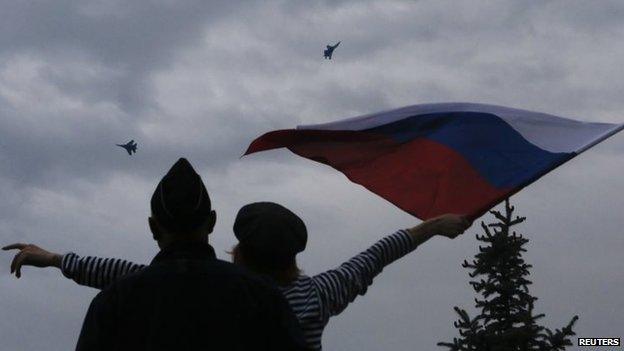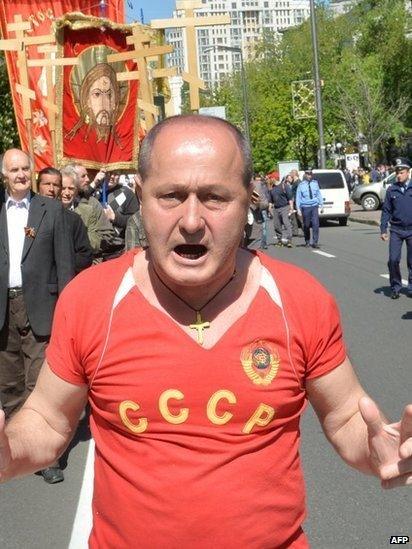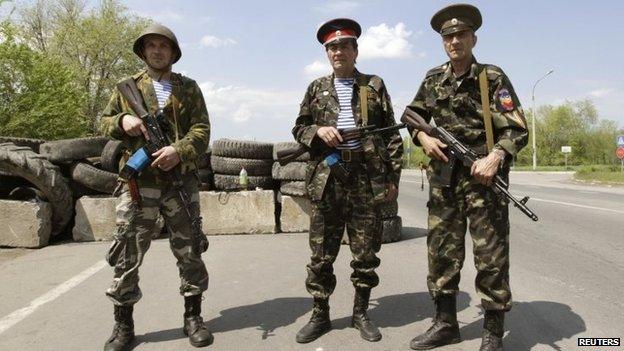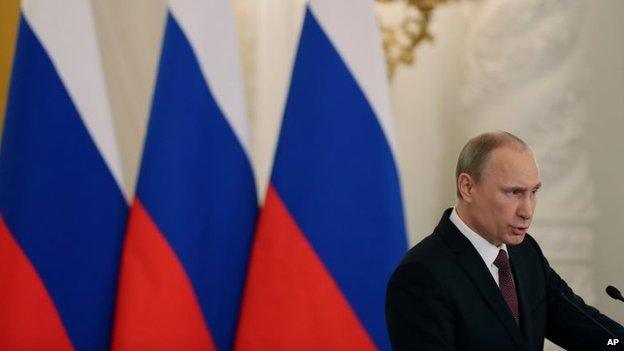Powerful emotions stirring in Russia's 'divided nation'
- Published

Recent events have stirred up feelings of pride among many Russians
In 1993, during a filming trip to Tajikistan, we chanced upon an extraordinary and disturbing scene.
Hundreds of Russians were huddling in railway cattle trucks, in sub-zero temperatures, desperate to escape the civil war ravaging a newly independent Soviet republic.
Although there was no hope of getting out quickly - the railway lines had been blocked by one of the warring parties - the refugees told us of their determination to go home to Mother Russia whatever it took.
At the time I told myself there would be a price to pay for this and countless other scenes of displacement, misery, and dispossession triggered by the 1991 collapse of the USSR.
New rules
It has taken a long time, and there have been a few false starts (in places like Moldova and the Caucasus), but it is clear that we have now arrived at the moment where the Kremlin is ready to dictate new rules to its neighbours, the former Soviet republics where millions of Russians still live.
This was explicitly signalled in March by President Vladimir Putin in his speech annexing Crimea, when he described Russia as "one of the biggest, if not the biggest, divided nation in the world".
Evidently Mr Putin is determined to lead as well as defend the interests of his divided nation, and where possible, as in Crimea, to reunite it.

Displays of affection for the Soviet-era have been on show
What then are the new rules for neighbours?
"Countries with large Russian populations can only survive," says Dmitri Trenin, a former army colonel and Moscow head of the Carnegie Endowment think tank.
"If they take the needs of those people into account… [it] doesn't mean that they have to join the Russian Federation, but it means that they should never think of opposing the Russian Federation."
This new assertiveness may appal some Western leaders, but it thrills the Russian public.
"The triumphant annexation of Crimea enabled Russians to once again feel that they are living in a country that is a great power", says Vladimir Ryzhkov, a former member of the Duma or parliament.
Guided by patience
He adds: "There seems to be [public] support for new territorial acquisitions under the pretext of protecting Russian-speaking populations in former Soviet republics."
One key principle that has guided President Putin on the path to this moment is patience.
After all, it is nine years since he described the fall of the USSR as one of the greatest misfortunes in history.
Since then, he has built the Russian economy, reformed the armed forces and watched the West slipping into pacifistic introspection in the wake of Iraq and the financial crisis.
It is clear though that many others in Russia have also been biding their time and that Russia has developed all manner of subtle ways of influencing a situation without overtly using force.
Take, for example, that particularly professional and well-armed squad of men in the Ukrainian town of Kramatorsk, who many initially assumed must be the Russian army.

Pro-Russian armed men have been seen in many parts of Ukraine
It turns out they are members of Wolf Company, a paramilitary Cossack group formed in southern Russia soon after the fall of the Soviet Union.
"We've been at it for almost 20 years, with different men, as part of different military forces," the commander, Yevgeny Panomaryev, told a Western reporter, "but always as the Wolves' Company."
The Cossacks appeared in various conflicts from Transnistria to Georgia and they provide an excellent tool for unconventional warfare.
The notion that such heavily armed groups could operate from their native Kuban region of southern Russia without the involvement of the security services is fanciful.
Cyber warfare
Yet Cossack "volunteers" are more easily disowned than the platoons of paratroops or naval infantry sent to secure key points in Crimea as the takeover started.
Other deniable methods, such as cyber warfare or the sending in of activists, have been carried out from the Baltic republics to Georgia too.
This flexibility in methods, as well as patience in timing, suggests that those expecting a succession of Russian invasions to ensue now from the Baltic to the Caucasus, may be deluding themselves.
The takeover of Crimea was spurred by an unusual opportunity - exploiting the seizure of power in Kiev to deny the legitimacy of the revolutionary authorities there and to mobilise Russians living in Ukraine through their hatred of fascism.
That the official media in Russia feel they have tapped into some powerful undercurrents of resentment in the country is clear.

President Putin says Russia is one of the world's biggest divided nations
Broadcasts by Channel 1 or the Rossiya 24 news channel are full of claims that Western mercenaries are killing the good people of Ukraine as part of a Nato strategy of trying to gobble the country up so that its forces can be poised on the borders of Russia.
So while the Kremlin currently shows signs of wanting to de-escalate the crisis and get back to business as usual, particularly with the Europeans, some powerful emotions have been stirred, showing the public appetite for reversing the humiliations of the early 1990s.
Loved or feared?
The issues left by that turbulent period tap into both a public nostalgia for what has been lost and a pride in Russian power for the future. The consequences for Western countries are unsettling.
Any idea of drawing Russia into a co-operative partnership with Nato, as some hoped to do a few years back, seems dead and buried.
Economically there could be a drawing back too, as Europe seeks alternative energy sources, or investment banks reassess the risks of projects here.
The suffering of those who fled Tajikistan in cattle trucks, or who stayed behind in Estonia or Georgia, as what they would regard as second-class citizens, has proven to be long-lasting and potent.
It's how Mr Putin and his successors harness it that will determine the degree to which a newly empowered Russia is loved or feared by the wider world.